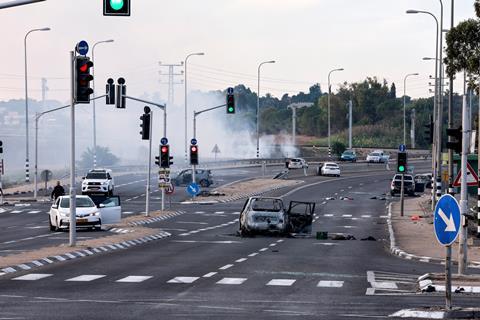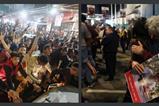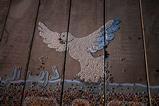The murder and kidnappings of civilians by the terrorist group Hamas have been described as “Israel’s 9/11”. Journalist Gavin Drake is a frequent visitor to Israel and Gaza. He explains what has taken place, what might happen next, and how Christians should be praying

This weekend’s surprise attack by Hamas came as Jews in Israel, and around the world, marked the shabbat, or sabbath, at the conclusion of Sukkot, a major biblically-mandated Jewish harvest festival. Sukkot is a time of joy and family gatherings that comes hard on the heels of Yom Kippur, the Day of Atonement, which is the most solemn day in the Jewish calendar, and Rosh Hashanah, the Jewish New Year.
It is no understatement to say that Israel was unprepared for the attack. The country and its residents are used to rocket fire from Gaza and sporadic outbreaks of violence; but this is on a different level. For the first time, Hamas fighters managed to break out of the Gaza strip, and roam around Israeli towns, murdering civilians and taking as many as 100 hostages back to Gaza. Recognised as a terrorist organisation by the UK and the US, Hamas did not only target soldiers, but civilians. A wheelchair bound Holocaust survivor is thought to be among the captives.
Unprecedented
What is taking place right now is not comparable to the intifadas (uprisings) of 1987 and 2000. It is all-out war – on a scale not seen since the 1973 Yom Kippur War, when as many as 20,000 people died.
Inevitably, the conflict has brought out extremists. But those joining in the anti-semitic calls for Israel to be wiped out – using phrases like “from the river to the sea” to describe how they would like to see Palestine – will be disappointed. Ever since the State of Israel came into being in 1948, the country has faced decades of wars and conflicts with its neighbours. But Israel has always won.
Extremist voices calling for Gaza to be flattened are more likely to have their way. While the total destruction of Gaza is unlikely, the response from Israel will almost certainly be hard and brutal. Unlike most of the previous Gaza-Israeli conflicts, this one won’t be fought solely by airstrikes.
By taking Israeli hostages into Gaza, Hamas are inviting an inevitable “boots on the ground” response. Israeli troops will have no choice but to enter Gaza – and enter it with significant force – in an attempt to rescue the hostages. Hamas challenge the word “hostages”, saying that they have taken “prisoners of war”. But their protest is meaningless. Prisoners of war refers to captured combatants, not women and children kidnapped from their hosues.
The background
Supporters of Palestine describe Gaza as the world’s largest open-air prison. And there is merit in that description. But it needn’t have been like that. In 1993, a major breakthrough came in negotiations between Israelis and Palestinians. Among the measures in the Oslo Accords was the start of Palestinian self-rule in a number of areas – including Gaza. The Israeli settlements in Gaza were evacuated and residents moved elsewhere in Israel. The territory was handed over to the Palestinian authority.
The stated aim of Hamas is the complete destruction of Israel
I visited Gaza in 1994, days after the Palestinian Authority took over. I had been warned to expect rocks and stones to be thrown at the vehicle. Instead, the Palestinian residents threw flowers and approached the bus with cups of coffee – delighted that people had come to visit.
The United States, the European Union and many other countries poured hundreds of millions of dollars into the Palestine Authority to support this embryonic government-in-waiting. Unfortunately, as has been the case in so many other parts of the world, the transition from freedom-fighters to civil administration wasn’t easy. Palestinian people didn’t see many benefits, but their leaders got new large houses, expensive cars and other luxuries.
As a result, the Palestinian people rejected their Fatah leadership and in January 2006 elected an Hamas-controlled legislature. After 17 months of in-fighting between Hamas and Fatah, Hamas took over Gaza in a brutal attack. They killed Fatah-linked police officers and other Palestinian Authority figures - throwing officials from rooftops according to some reports. The Palestinian leadership was separated, with Hamas controlling Gaza and Fatah in charge of the West Bank.
The stated aim of Hamas is the complete destruction of Israel. It’s charter is replete with Islamist language, stating in the opening paragraphs: "Israel will exist and will continue to exist until Islam will obliterate it, just as it obliterated others before it.”
One of Israel’s founding principles is a safe homeland for Jews. This dream of a Jewish homeland didn’t begin with the holocaust, because while the holocaust stands alone in its scale of evil and death, it wasn’t the first example of anti-Jewish antisemitism. Jews have faced centuries of pogroms and persecution – often from Christians. As a result of this, they have a determination to ensure that never again will Jews be left unprotected.
This is why Gaza is effectively sealed off. It isn’t fully sealed. There is a pedestrian border crossing and some 17,000 Palestinians living in Gaza have permits to work in Israel. This border is closed from time to time but re-opened only last Thursday after being closed for two weeks because of violent protests.
The future
This latest attack by Hamas makes life for Gazans worse. Israel’s response to the war has been, and will be, brutal. Israeli extremists and moderates will be united in determination to make sure this never happens again. The Israeli government will face immense pressure to ensure that Hamas are destroyed. And they will have the will to try to do this.
As Christians, our first response must be to pray.
So far, the conflict is confined mainly to the borders of Israel and Palestine, with some cross-border fighting in Southern Lebanon. If proof emerges that Iran has had a significant role in the planning of the attack, as has been suggested, expect the war to develop. The US are already moving a naval battle group to the eastern Mediterranean.
The Christian response
As of Monday morning, the death toll stands at more than 1,000 people. This is inevitably going to increase. As Christians, our first response must be to pray.
There are two evil positions: one is to be so pro-Israeli that you want to see Palestinians crushed, the other is to be so pro-Palestinian that you want to see Israel destroyed. Peace will only come to the Holy Land when Israelis and Palestinians – Jews, Muslims and Christians – feel secure and live in justice.
This attack by Hamas will do nothing to bring peace, security, and justice for Palestinians. If anything, it makes the dream of Palestinian statehood so much more difficult to see fulfilled.
In Psalm 122, King David extols us to pray for the peace of Jerusalem. That has never been more important.





































1 Reader's comment